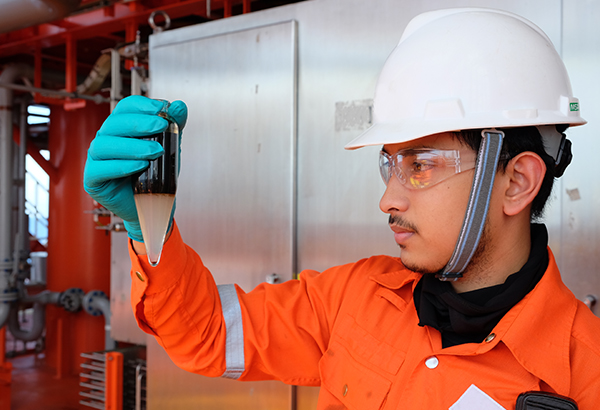
An Intensive 5-day Training Course
Clean Fuel Technology & Standards
Specifications, Standards, Analysis, and Quality Monitoring
Scheduled Dates
Classroom
| 30 Mar-03 Apr 2026 | Dubai - UAE | $5,950 | RESERVE A SEAT |
| 12-16 Oct 2026 | Dubai - UAE | $5,950 | RESERVE A SEAT |
| 29 Mar-02 Apr 2027 | Dubai - UAE | $5,950 | RESERVE A SEAT |
Online
| 12-16 Oct 2026 | Online | $3,950 | RESERVE A SEAT |
Would an alternative date be more suitable?
We offer a variety of tailored training options, customized to meet your organisation's needs. Delivered anytime, anywhere, we make it easy to bring expert training directly to your team.
Why Choose this Training Course?
As refiners and chemical producers worldwide see higher crude oil and feed prices and continued demand for clean transportation fuels and lower production costs, a sound knowledge of clean fuel technology, specifications, standards, analysis, and quality monitoring is essential to understand its effect on engine performances as well as the emissions impact on environment.
This PetroKnowledge training course has been developed to provide an in-depth, yet a practical review of the art and science of "Clean Fuel Technology and Standards" in modern refineries. The program’s content is both comprehensive and wide-ranging.
In addition to the scientific procedures and contents of this course, many case studies and implementations are planned to be presented in an open discussion forum with the participants.
This PetroKnowledge training course provides both theoretical and practical knowledge and skills highlighting:
- Fuel quality fundamentals
- Fuel production technologies
- Euro 5 and Euro 6 fuel specifications
- Gasoline specifications
- Jet Fuel specifications
- Diesel specifications
- Fuel quality monitoring system
What are the Goals?
At the end of this PetroKnowledge training course, you will learn to:
- Describe clean fuels chemistry, manufacturing technologies, and standards
- Compare testing parameters for gasoline, jet fuel, and road diesel
- Explain how fuel properties influence engine performance
- Explain ultra low sulfur diesel properties and their impact on fuel performance
- Troubleshoot quality problems and contamination of fuels
- Discuss fuel quality monitoring system
Who is this Training Course for?
This PetroKnowledge training course is suitable for a wide range of professionals but will greatly benefit:
- Operation Engineers
- Process Engineers
- Senior Operation Personnel
- Operation Staff
- Technical Supervisory Staff
- Plant Engineers
- Fuel quality specialists
- Measurement and quality control operators
How will this Training Course be Presented?
A highly interactive combination of lecture and discussion sessions will be managed to maximize the amount and quality of information, knowledge and experience transfer. The sessions will start by raising the most relevant questions and motivate everybody finding the right answers. The attendants will also be encouraged to raise more of their own questions and to share developing the right answers using their own analysis and experience.
Participants in this PetroKnowledge training course will receive thorough training on the subjects covered by the seminar outline with the Tutor utilizing a variety of proven adult learning teaching and facilitation techniques.
Organisational Impact
- This PetroKnowledge training course will emphasize clean fuels chemistry, manufacturing technologies, blending, distribution, handling and troubleshooting techniques that would lead ultimately to improved fuel utilization, optimization, and enhanced organizational economics
- Many aspects of clean fuel production operations and management can be improved including, product qualities, monitoring, and safety
- This course will guide the participates to develop key concepts and techniques for the refining of petroleum processes and clean fuel manufacturing economics. These key concepts can be utilized to make operating decisions that can improve the overall refinery performance and economics
Personal Impact
By attending this PetroKnowledge training course, you will be able to:
- Understand clean fuels chemistry, manufacturing technologies, and handling.
- Increase fuel efficiency keeping safety as a prime consideration
- Improve On-Time performance while reducing operational expenses
- Conduct a "Fuel Efficiency" audit of your organization
- Develop Fuel Efficiency Program Evaluation tools
Daily Agenda
Day One: Introduction to Oil Refining and Fuel Quality Fundamentals
- Crude oil chemistry and properties
- Classification of crude oils
- Crude assays and valuation
- Petroleum product specifications
- Petroleum products standardization and quality control
- Introduction to oil refineries
- Refinery configurations
Day Two: Gasoline
- Gasoline chemistry
- Manufacturing technologies: Naphtha Hydrotreater, Catalytic Reformer, Isomerization and Alkylation Units
- Gasoline specifications and quality monitoring system
- Testing parameters for gasoline
- Composition, Combustion Characteristics, Octane Number, Corrosiveness, Density, Flash Point and Fire Point, Oxygenates, Stability, and Instability, Volatility
- Effect of fuel properties on engine performance
- Troubleshoot quality problems and contamination of gasoline
Day Three: Jet Fuel
- Jet fuel chemistry
- Manufacturing technologies
- Jet fuel specifications and quality monitoring system
- Testing parameters for Jet fuel
- Acidity, Calorific Value, Density, Flash Point, Freezing Point, Storage Stability, Thermal Stability, Viscosity, Volatility, Water
- Effect of fuel properties on engine performance
- Troubleshoot quality problems and contamination of jet fuel
Day Four: Diesel Fuel
- Diesel fuel chemistry
- Manufacturing technologies (Hydroprocessing)
- Diesel fuel specifications and quality monitoring system
- Testing parameters for Diesel fuel
- Acidity, Sulfur content, Appearance and Odor, Ash, Calorific Value, Carbon Residue, Cetane Number and Cetane Index, Cloud Point, Composition, Diesel Index, Flash Point, Freezing Point, Neutralization Number, Pour Point, Stability, Viscosity, Volatility, Water and Sediment
- Ultra low sulfur diesel
- Effect of diesel fuel properties on engine performance
- Troubleshoot quality problems and contamination of diesel fuel
Day Five: Euro 5 and Euro 6 Fuel Specifications and Emissions Standards
- Overview of Euro 5 and Euro 6 fuel specifications and emissions
- Quality control of products in petroleum refining
- Clean Fuel specifications
- Sampling procedures
Certificate
- On successful completion of this Training Course / Online Training Course, a PetroKnowledge Certificate / E-Certificate will be awarded to the delegates.
